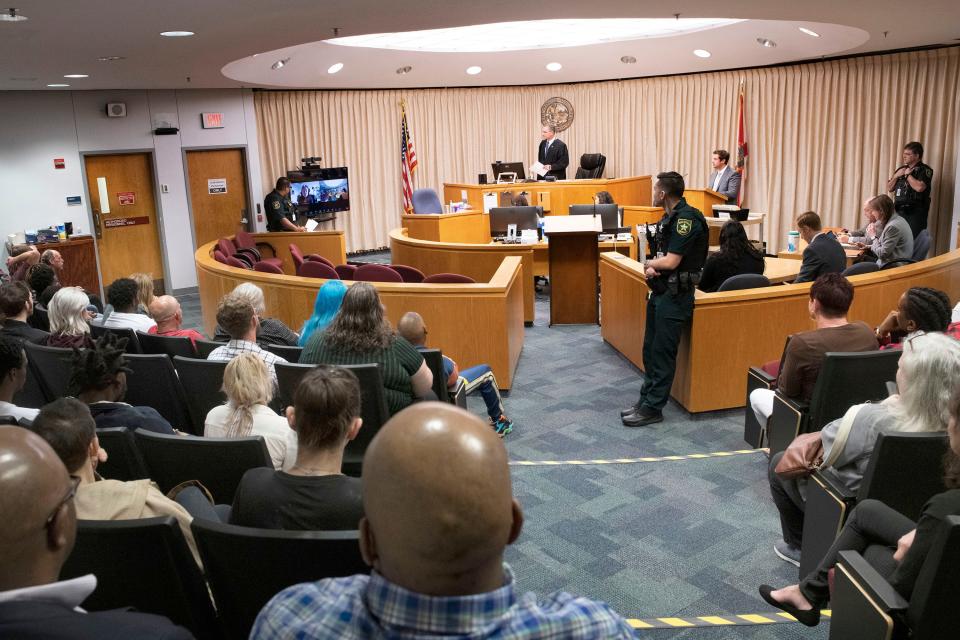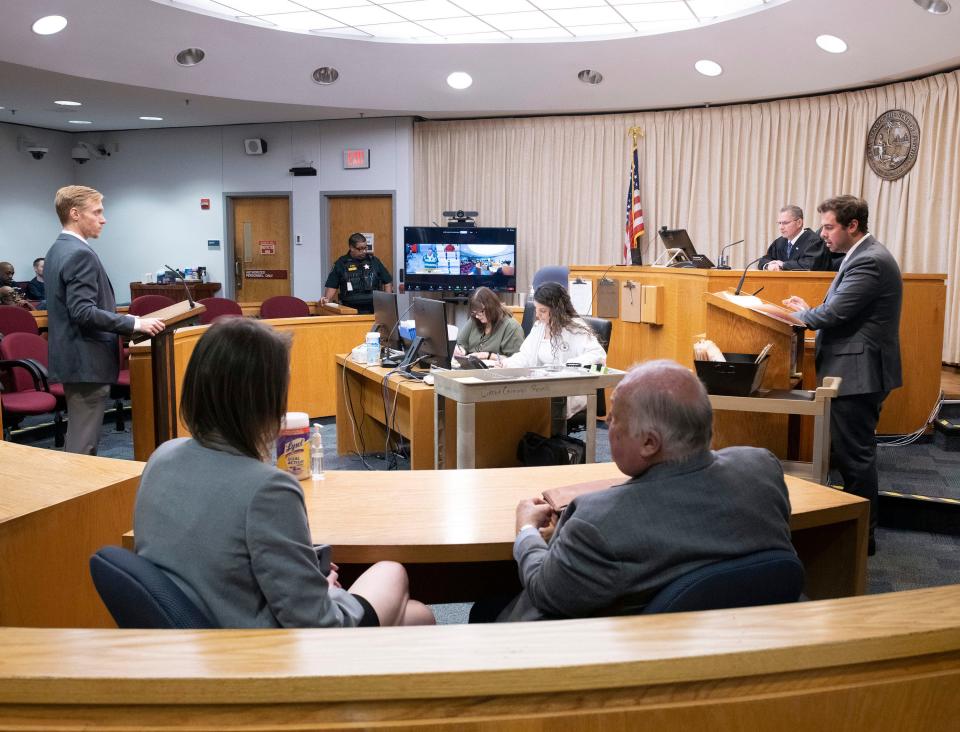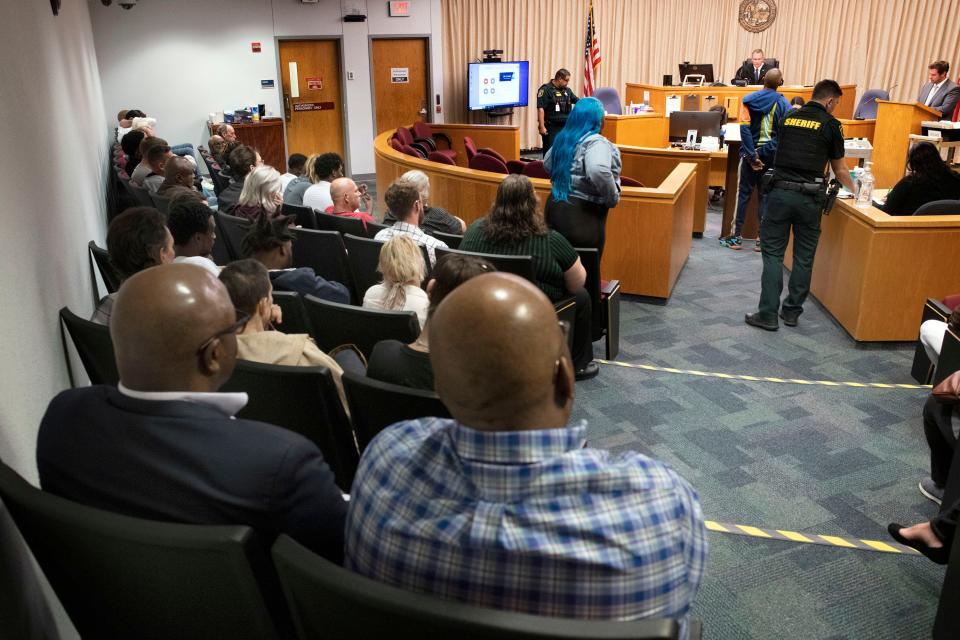Cases backed up when courts shut down during COVID. Here's what they learned for next time:
Almost three years after the initial COVID-19 temporarily shut down Florida courts, officials in the First Judicial Circuit are still working to whittle down the backlog of cases.
And although the pandemic was a major disruption to the court system, it provided a valuable lesson.
“What we’ve learned from COVID is that we needed to modernize our office,” said State Attorney Ginger Bowden Madden.
In the age of rapidly advancing technology and the push toward remote work, Bowden Madden says the pandemic and backlog of cases required in-office changes to increase efficiency and flexibility for staff.
So, the State Attorney’s Office is going digital.

SA seeks death penalty:Death penalty sought for suspect indicted in Okaloosa deputy's homicide
Investigation exonerates deputies:State Attorney: ECSO deputies will not be charged in fatal shooting of Navy Point man
Most of the transition revolves around updating and changing its case management system to store most paperwork that would traditionally be printed, according to Assistant State Attorney Cierra Burns.
Burns works closely with the circuit’s Internet Technology department acting almost as a liaison to help explain how the attorneys operate daily so IT can make the paperless system seamless and easy for attorneys to use.
“What we’ve basically done is tried to focus on less paper that we rely on,” Burns said. “We are utilizing our internal case management system in a different manner so that we can rely on that management system to contain our paperwork and our evidence, and in turn we have to print much less, which obviously saves money and is much better for the environment.”
David Folsom, the circuit's executive director, said it was not practical to just throw everything into an online or electronic format, which would prevent users from efficiently finding documents, so they had to create a searchable system to easily find their documents.
"We came up with a very robust plan to not just not print things, but to move information," Folsom said. "We had to adapt a records program that was user friendly, so you don't have to thumb through thousands of documents. We had to build search capabilities."
The First Judicial Circuit’s IT Director Kris Blom told the News Journal that while “it’s very difficult to quantify,” they are currently around 50% paperless and the entire circuit will be “100% by this summer.” He also said any documents or data with sensitive information will be sent through encrypted email and housed behind a firewall.
As the transition continues, Bowden Madden says she looks forward to becoming 100% paperless so that in the event the courthouse closes again, all the attorneys can continue their work remotely.

“That’s a big deal, because if something were to happen, all of our people would be equipped to go home, work from home, they can do all their work, they have access to all of their programs,” she said. “That’s one of the real positive outcomes.”
One of the inspirations for the transition was Florida’s Fourteenth Judicial Circuit, which includes the Panama City area. Under former State Attorney Glenn Hess, the circuit went paperless after Hurricane Michael.
“Their office was uninhabitable, they couldn’t work there, and I think they might have lost a lot of paper files,” Bowden Madden said. “So, when the pandemic came through, they could shut their office down and send their people home and they had the capability to work remotely.”
First Judicial Circuit courts didn’t have the same capability when the pandemic struck.
“Everything shut down and everyone went home,” Bowden Madden said. “That’s when the cases just stopped, and they began to back up.
“Crime didn’t rise and there were more cases coming in … and the ones that were pending just weren’t getting resolved,” she added. “That probably went on for about a year.”
Even after court sessions resumed, things moved much slower because of social distancing requirements.
Some judges can have upwards of 100 cases in a single sitting for criminal arraignments, docket days or plea days, so restrictions to the number of people who could be seated in court slowed proceedings as court security cycled groups of people in and out of the courtroom.
“What could’ve taken us a day — start by 8:30 a.m. and we’re out by 11:30 a.m. — would be an all-day event, because people are just moving in so slow,” she added.

Now, without restrictions, the state attorney says the caseload has become more manageable, but she would like to see the numbers decrease.
“I think we’ve got our numbers back under control now in Escambia County,” Bowden Madden said. “Numbers are still pretty high circuit-wide.”
The entire First Judicial Circuit — which encompasses Escambia, Santa Rosa, Okaloosa and Walton counties — and their “high” case numbers does not necessarily mean other counties are lagging behind Escambia, Bowden Madden said, but rather a host of variables contribute to each county’s case disposal such as the number of judges available and each county’s technological capabilities.
Bowden Madden the transition to digital will not only help prepare the circuit for any future shutdowns, but will permanently increase the efficiency of attorneys as they work to keep decreasing the backlog.
“We’re doing pretty good,” Bowden Madden said. “We have a long way to go.”
This article originally appeared on Pensacola News Journal: COVID backlog hit First Judicial Circuit hard but it taught lessons

